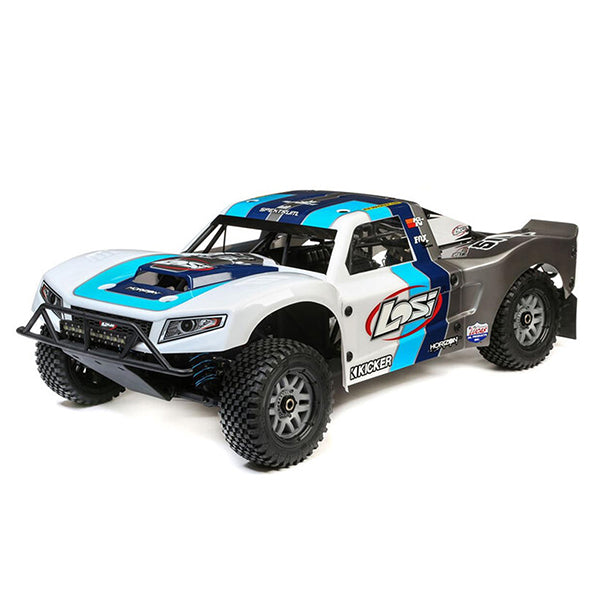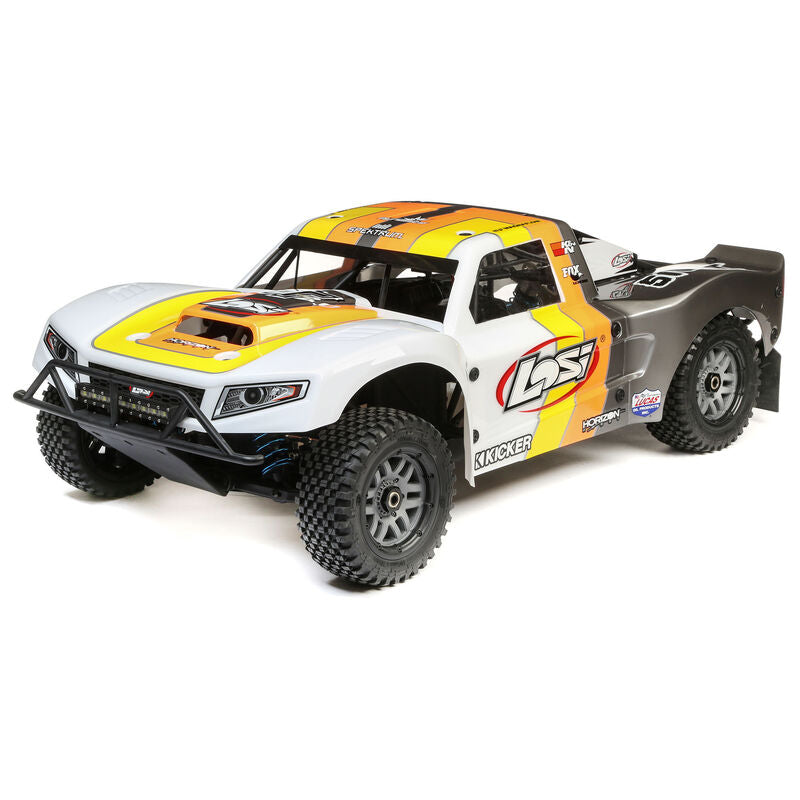What are Gas RC Cars and Trucks?
Here, we break down the key differences between gas, electric, and nitro RC vehicles.
-
Gas RC Vehicles: These cars and trucks use gasoline engines, much like real cars. For this reason, they offer a lifelike driving experience, built for heavy-duty use.
-
Nitro RC Vehicles: Nitro cars use a special fuel, which combines nitromethane, methanol, and oil. Although they are powerful, they require more maintenance than gas or electric models.
-
Electric RC Vehicles: Powered by rechargeable batteries, electric RC cars are the simplest to operate and maintain. They are quieter and more convenient but may lack the raw power and realism of gas models.
Benefits of Gas RC Vehicles
-
Authentic Experience: Gas RC cars mimic the driving experience of full-sized vehicles, complete with engine sounds and exhaust fumes. This makes every race feel genuine and immersive.
-
Power and Performance: They typically offer more power as well as longer run times compared to electric alternatives. Their engines deliver high torque and acceleration, ideal for serious racing and off-road adventures.
-
Durability: Designed for heavy-duty use, gas RC trucks and cars can withstand rough terrains and high speeds.
-
Larger Scale Models: They often come in bigger models, which are not only visually impressive but also offer better stability and handling.
Types of Gas RC Vehicles
There are two main types of gas RC vehicles: cars and trucks. Each one offers a different experience, which is important to understand to help you make the right choice.
Gas RC Cars
Gas RC cars are designed for speed and precision on paved surfaces. Popular models include the Losi 5IVE-T 2.0 and HPI Baja 5B. These cars are perfect for on-road racing enthusiasts looking for an authentic driving experience.
Gas RC Trucks
Gas RC trucks are built for durability and performance on rough terrains. They can handle off-road adventures, jumps, and bumpy trails with ease. The Losi 5IVE-T 2.0 V2 1/5 Bind-N-Drive 4WD Short Course Truck w/32cc Gasoline Engine is a favorite among those who crave adventure and reliability in their RC vehicles.
Key Features of Gas RC Cars and Trucks
There are a variety of essential aspects to keep in mind when selecting your gas RC truck or car. Take a look at what they are:
-
Engine Performance: The heart of any gas RC vehicle, a powerful engine ensures high speeds and better performance. Meanwhile, fuel efficiency means longer run times and fewer refuels. Look for models with well-built, reliable engines that deliver consistent power.
-
Build Quality and Durability: Look for vehicles made from high-quality materials like aluminum or reinforced plastic. Robust construction gives your RC vehicle the ability to withstand the rough and tumble of racing and off-road adventures.
-
Ease of Maintenance: Choose models that are easy to clean and have accessible parts. Regular RC maintenance includes checking the engine, cleaning filters, and ensuring all parts are in good working order.
-
Suspension and Handling: Quality suspension systems with adjustable shocks and durable components are essential for smooth handling and control, especially on rough terrains.
-
Customizability: If you enjoy customizing your vehicles, Opt for something that offers a wide range of aftermarket parts and accessories. This way, you can upgrade and tweak your RC car or truck to better suit your driving style and preferences.
Maintenance Tips for Gas RC Vehicles
To keep your gas RC car or truck in top condition, you need to keep up with its maintenance. Follow these tips to keep it running smoothly:
-
Regular Engine Checks: Make sure to inspect for any signs of wear and tear, clean the air filters, and keep the carburetor in good condition.
-
Cleaning and Storage: After each use, remove dirt and debris from the chassis, wheels, and other RC parts. Store your vehicle in a cool, dry place to prevent rust and damage. Using protective covers can also help keep it in top shape when not in use.
-
Fuel System Maintenance: Regularly check the system for leaks and ensure the fuel lines are clear. Use high-quality fuel and add a stabilizer if the vehicle will be stored for an extended period.
-
Tire and Suspension Checks: Inspect the tires for wear and ensure they are properly inflated. Check the suspension system for any loose or damaged parts and make adjustments as needed to maintain optimal handling.
Why Choose RC Visions for Gas RC Cars and Trucks?
If you’re ready for next-level power and realism in your RC hobby then purchasing a gas RC vehicle is a must. At RC Visions, we promise excitement and durability with gas RC cars and trucks that offer exceptional build quality, realistic performance, and cutting-edge technology at a competitive price.
Take a look at our detailed product descriptions and comprehensive maintenance tips to help you make an informed decision. And don’t hesitate to seek expert advice from our friendly team should you have any more questions.
FAQ
Are gas RC cars faster than electric?
Gas RC cars offer a more realistic and longer driving experience, but when it comes to speed, electric RC cars typically have the edge. Electric models, especially those with brushless motors and LiPo batteries, often achieve higher speeds and quicker acceleration compared to their gas-powered counterparts.
What is the difference between nitro and gas RC cars?
Nitro RC cars use a special nitro fuel made from a mix of nitromethane, methanol, and oil, and they require more frequent maintenance and tuning. Gas RC cars, on the other hand, run on regular gasoline mixed with oil and offer a more straightforward and cost-effective option for longer run times and easier upkeep.
How fast can a gas powered RC car go?
Gas-powered RC cars can reach impressive speeds, typically ranging from 30 to 50 mph, depending on the model and engine size. Some high-performance models can even push the limits beyond 60 mph.
Does RC fuel expire?
Yes, RC fuel can expire. Over time, its particles can separate or degrade, especially if the container is not properly sealed. It's best to use fresh fuel and store it in a cool, dry place to ensure optimal performance for your RC vehicle.


